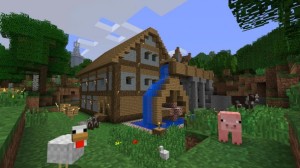
Answer: by not working very well. I’ll explain.
My son spends a lot of time playing Minecraft. It’s a brilliant game that operates in two modes: creative mode, in which you can build all sorts of structures and even simple circuits my collecting raw materials and re-shaping them; and play mode, in which you and other creatures try to kill each other. (I call it “brilliant” because of the sizable ratio between its simplicity and the amount of stuff you can do with it. By this measure, writing and pocket knives are about the most brilliant inventions ever.)
But you can make Minecraft even cooler by downloading different “mods” which add new animals or events or features to the Minecraft land. The trick is that you have to figure out how to download a mod and plug it into your game. My son was immediately baffled, and so I tried to help him. Now I’m nothing like an expert, but I’m generally pretty good at solving this sort of problem. (I’m even better at electrical or plumbing problems.) But I soon was baffled as well and gave up. He kept at it, figured it out, and by now has incorporated several mods. He has learned a lot.
There’s nothing special computers are offering here. They are basically presenting an environment of raw materials which need to be cleverly exploited in order for us to get what we want. In ye olden days, this environment was presented by “the world” or “the garage” or “the broken bike”, which similarly provided promising potential for those willing to exercise some cleverness. The reason I’m so good (well, not a total failure) at electrical work is that when I was 10 or so my brother gave me a shoebox full of toggle switches, and within a couple weeks everything in my room was toggle-switched. I learned how some things work, but more importantly I learned that, for many problems, I could figure it out. That, I hope, is what my son has learned from the difficulty of incorporating mods into Minecraft.
“The lecturer pumps laboriously into sieves. The water may be wholesome, but it runs through. A mind must work to grow,” wrote Charles W. Eliot. But this sentiment has been used to support all sorts of classroom activities and projects which only provide fake problems to be solved by ad hoc teams. A large part of the education provided by higher ed (I suspect) has to do not with these ersatz engagements, but with the obstacles and problems thrown up by higher ed institutions (and by early-adulthood life generally). How do I satisfy the Gen Ed requirements? What are they, anyway? How can I complete this major? How do I convince the Financial Aid office that in fact the check did not arrive? Big institutions are better than broken bicycles at providing the appropriate sorts of challenges for adult life. And computers, of course, make the problems even more difficult, since one can no longer simply rely on genuine communication with an intelligent human, but most now figure out how to get a stupid system to accept a certain cluster of data.
So bring on the advantages, speed, and efficiencies of computers into education. They can only make our problems that much more difficult, and thereby make us smarter.
Leave a comment